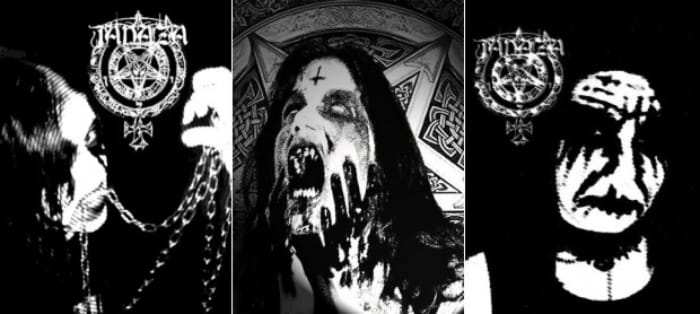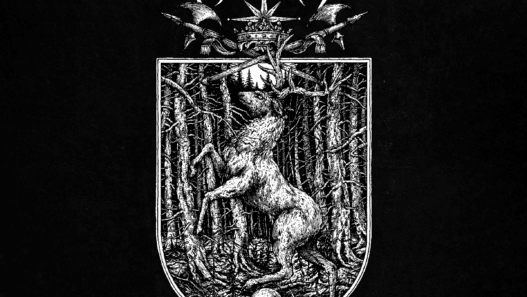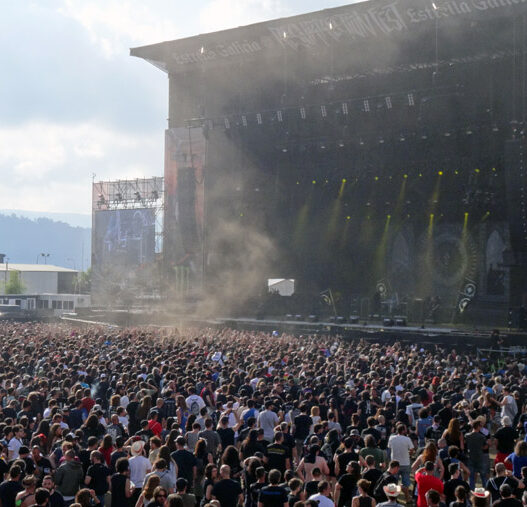(English Below)
A lo largo de la historia, el metal extremo, en sus diversas formas, ha funcionado como un medio para expresar realidades brutales, protestar y disidencia. Esto es particularmente notorio en la música de grupos que han tenido que abandonar sus países debido a conflictos políticos o persecuciones. Este «exilio del metal» no es simplemente un suceso migratorio, sino una expresión de la capacidad de resistencia artística, en la que la música se transforma en el último refugio de la protesta y la identidad cultural.
El exilio tiene un impacto significativo en la música y la poesía de estos grupos, otorgándoles una autenticidad y una intensidad que son difíciles de duplicar. El exilio no es un asunto, sino la esencia misma de su obra.
El Grito de Guerra y el Reflejo de la Tragedia
La banda iraquí Janaza es un ejemplo evidente de esta diáspora. En medio del caos de la guerra en Irak, Anmar Al-Saffar estableció el grupo en Bagdad. Su música, un black metal crudo y atmosférico, es una narración en sonido de la angustia, la aniquilación y el sometimiento que experimentaron. Según Anmar, las canciones de Janaza no son únicamente música, sino un modo de «liberarse de la ira y el enfado» que se han ido acumulando. La agrupación ha tenido que lidiar no solo con la violencia bélica, sino además con el peligro de organizaciones extremistas que consideran el metal un arte blasfemo. Después de verse forzado a escapar, Anmar siguió con el proyecto desde el exilio, empleando internet para comunicarse con su público y difundir su música., convirtiendo sus álbumes en testimonios de la tragedia de su tierra.

El caso de la agrupación musical ucraniana Drudkh, de manera parecida, tiene resonancia con la historia reciente. La guerra en su país natal ha tenido un impacto irreversible en su música, a pesar de que no se exiliaron como Janaza. Drudkh, famosa por su black metal pagano y atmosférico, ha indagado siempre en la historia y el folklore de Ucrania. No obstante, en el marco de la invasión, sus letras y ambientes han tomado una nueva y oscura importancia, convirtiendo al black metal en un canto de resistencia. La banda, con sus integrantes evasivos, ha logrado preservar su anonimato, un método que les ha facilitado seguir creando sin poner en riesgo su seguridad.
Apoapsis es otra banda de Death Metal de Arabia Saudita que se destaca. Los integrantes de la banda tuvieron que crear y ensayar en secreto en una nación donde la música occidental, particularmente el metal, es severamente castigada y censurada. Al final, se vieron forzados a encontrar refugio en Europa para poder seguir con su proyecto sin temor a represalias. Su música, que es compleja y agresiva, expresa la frustración de estar sometido a una opresión ideológica, transformando cada riff en un acto de resistencia.
La Lucha por la Supervivencia Creativa
Para los grupos en el exilio, grabar y producir se transforma en una gesta. No tienen acceso a la infraestructura de la industria musical occidental ni a estudios profesionales la mayor parte de ellas. Con equipos sencillos, en habitaciones y con la colaboración de personas que trabajan a distancia, se graban sus discos. Herramientas como Bandcamp y redes sociales como Facebook o Instagram son esenciales no solamente para comercializar su música, sino también para establecer una comunidad y preservar la conexión con sus oyentes y sus raíces.
De hecho, conectar con la audiencia es uno de los mayores retos y también la mayor gratificación. Las bandas de la diáspora no realizan giras extensas, pero sus seguidores, frecuentemente activistas o también miembros de la diáspora, les ofrecen un apoyo incondicional. Esta relación es un reflejo de su propia lucha: no solo escucha la música el público, sino que también se identifica con el mensaje y el sufrimiento que encierra. Cada vez que se descarga algo, o se adquiere un disco de vinilo o una camiseta, se da un acto de resistencia y solidaridad.
La Música como Identidad y Protesta
El metal extremo en el exilio es más que un estilo musical; se trata de una expresión cultural que busca sobrevivir. Estas agrupaciones musicales consiguen encapsular la rabia, el dolor y la impotencia que han experimentado utilizando riffs disonantes, voces guturales y atmósferas agobiantes. Su música es un recordatorio de que la voz de la disidencia no puede ser acallada, aun en los contextos más oscuros. A menudo, los regímenes que intentan suprimir la cultura, la historia y la identidad recurren al metal como un medio para preservarlas.
La diáspora del metal nos hace recordar que, en un mundo donde la música se consume de manera masiva y fugaz, el arte es una necesidad para algunos, no un lujo. Estas bandas nos exigen ver más allá de la música e interpretar el contexto que la originó. Son los auténticos héroes del underground, quienes, con cada nota, evidencian que la música tiene el potencial de ser una fuerza poderosa de resistencia y esperanza.
Throughout history, extreme metal, in its diverse forms, has functioned as a medium for expressing brutal realities, protest, and dissent. This is particularly notorious in the music of groups that have had to abandon their countries due to political conflicts or persecutions. This «metal exile» is not simply a migratory event, but an expression of the capacity for artistic resistance, in which music transforms into the last refuge of protest and cultural identity.
Exile has a significant impact on the music and poetry of these groups, granting them an authenticity and an intensity that are difficult to duplicate. Exile is not a subject, but the very essence of their work.
The War Cry and the Reflection of Tragedy
The Iraqi band Janaza is an evident example of this diaspora. In the midst of the chaos of the war in Iraq, Anmar Al-Saffar established the group in Baghdad. Their music, a raw and atmospheric black metal, is a narrative in sound of the anguish, annihilation, and subjugation they experienced. According to Anmar, Janaza‘s songs are not solely music, but a way to «free oneself from the anger and rage» that have been accumulating. The group has had to deal not only with wartime violence, but also with the danger of extremist organizations that consider metal to be blasphemous art. After being forced to escape, Anmar continued with the project from exile, using the internet to communicate with his audience and spread his music, turning his albums into testimonies of the tragedy of his land.
The case of the Ukrainian musical group Drudkh, similarly, resonates with recent history. The war in their native country has had an irreversible impact on their music, despite not being exiled like Janaza. Drudkh, famous for their pagan and atmospheric black metal, has always delved into the history and folklore of Ukraine. Nevertheless, in the context of the invasion, their lyrics and atmospheres have taken on a new and dark importance, turning black metal into a song of resistance. The band, with its elusive members, has managed to preserve its anonymity, a method that has facilitated them to continue creating without putting their safety at risk.
Apoapsis is another Death Metal band from Saudi Arabia that stands out. The members of the band had to create and rehearse in secret in a nation where Western music, particularly metal, is severely punished and censored. In the end, they were forced to find refuge in Europe in order to continue with their project without fear of reprisals. Their music, which is complex and aggressive, expresses the frustration of being subjected to ideological oppression, transforming each riff into an act of resistance.
The Struggle for Creative Survival
For groups in exile, recording and producing transforms into a feat. They do not have access to the infrastructure of the Western music industry nor to professional studios most of them. With simple equipment, in rooms, and with the collaboration of people who work remotely, their albums are recorded. Tools like Bandcamp and social networks like Facebook or Instagram are essential not only for marketing their music, but also for establishing a community and preserving the connection with their listeners and their roots.
In fact, connecting with the audience is one of the biggest challenges and also the biggest gratification. Diaspora bands do not carry out extensive tours, but their followers, frequently activists or also members of the diaspora, offer them unconditional support. This relationship is a reflection of their own struggle: the public not only listens to the music, but also identifies with the message and the suffering it contains. Every time something is downloaded, or a vinyl record or a T-shirt is acquired, an act of resistance and solidarity is given.
Music as Identity and Protest
Extreme metal in exile is more than a musical style; it is a cultural expression that seeks to survive. These musical groups manage to encapsulate the rage, the pain, and the helplessness they have experienced using dissonant riffs, guttural voices, and overwhelming atmospheres. Their music is a reminder that the voice of dissent cannot be silenced, even in the darkest contexts. Often, the regimes that try to suppress culture, history, and identity resort to metal as a means to preserve them.
The metal diaspora reminds us that, in a world where music is consumed massively and fleetingly, art is a necessity for some, not a luxury. These bands demand us to look beyond the music and interpret the context that originated it. They are the authentic heroes of the underground, who, with each note, evidence that music has the potential to be a powerful force of resistance and hope.





















